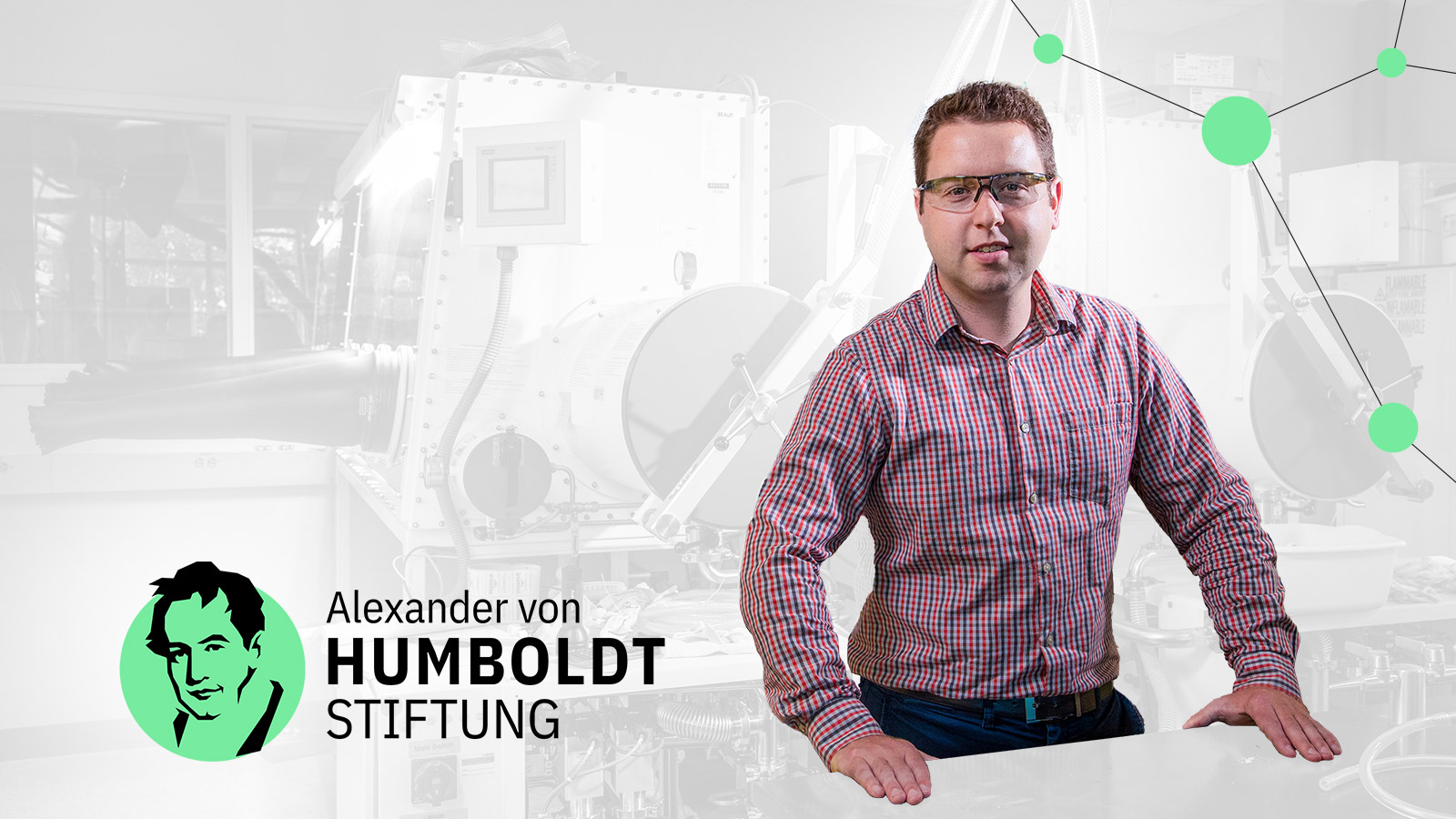Baylor Researcher Receives Prestigious Humboldt Research Fellowship
Caleb D. Martin, Ph.D., receives the honor of being a “Humboldtian.”

Contact: Kelly Craine, Baylor University Media & Public Relations, 254-297-9065
Follow us on Twitter: @BaylorUMedia
WACO, Texas (Feb 14, 2024) – Caleb D. Martin, Ph.D., associate professor of chemistry and biochemistry at Baylor University and a leading researcher in synthestic boron chemistry, has received a prestigious Humboldt Research Fellowship from the Alexander von Humboldt Foundation. Martin is the second professor from Baylor to receive the honor of being a “Humboldtian.” William Weaver, Ph.D., director of the Great Texts program and professor of literature in the Honors College, received a Humboldt research fellowship in 2014.
Established 1953 by the Federal Republic of Germany, the Humboldt Foundation promotes academic cooperation between German universities and excellent scientists and scholars from around the world with the goal of creating a global collaborative network of excellence.
“The Humboldt Fellowship is a meaningful honor and an exciting opportunity to practice collaborative research abroad. Top global scientists across all disciplines compete for this fellowship, and only 20 to 25% are selected,” said Kevin Chambliss, Ph.D., vice provost for research at Baylor. “Dr. Caleb Martin is very deserving. He has established himself at Baylor as a leading researcher marked by creativity and impact, and it will be exciting to see the work that results from his time in Germany.”
Fellowship recipients work with a German host and collaborative partner on their proposed research project and become part of the Humboldt network – a group of more than 30,000 researchers in 140 countries, including 61 Nobel Prize recipients, that provide greater opportunities for continued research and collaboration. In addition, Martin was awarded a Siebold-Collegium Fellowship from the University of Würzburg, which will provide housing in a restored 18th century building with 17 other international fellows while he is in Germany.
“The fellowship enables me to interact and work with the top researchers in Germany to elevate our research program,” Martin said. “The benefits of being a Humboldt Fellow are not only for the three-year period that I’ll spend time in Germany but are lifelong in being part of the Humboldt Network. I’m grateful to the Humboldt Foundation for this honor and to the German government for supporting this organization.”
Through the Humboldt Fellowship, Martin will be researching new boron compounds and their photophysical properties alongside world-leading researchers in the field, Todd Marder, Ph.D., and Holger Bauschewigh, Ph.D., of the Institute for Sustainable Chemistry & Catalysis with Boron at Julius-Maximilians-Universität Würzburg. The institute is the international epicenter for boron research providing access to a cohort of boron experts that Martin would not have without the Humboldt Fellowship.
“It will be a great pleasure for my colleague, Prof. Dr. Holger Braunschweig, and me to host Prof. Caleb Martin,” Marder said. “These prestigious and highly competitive Fellowships are awarded only to excellent researchers who have already established a strong reputation in their respective fields. As a previous recipient of a Humboldt Research Award and having hosted a number of Humboldt Fellows and Award winners over the past 12 years, I can personally attest to the excellence of the Humboldt Foundation and its outstanding support for those who achieve the honor of receiving one of their Fellowships or Awards.”
For John L. Wood, Ph.D., department chair and The Robert A. Welch Distinguished Professor of Chemistry at Baylor, the significant appointment will impact Dr. Martin and Baylor for years to come.
“The Humboldt Award is a fantastic and well-deserved recognition of Professor Martin’s contributions to the field of boron chemistry,” Wood said. “Professor Martin’s stay in Germany will not only add to Baylor’s increasing international reputation in cutting-edge research but also, through the auspices of the Humbolt Foundation, enable future Humboldt Fellows to spend time on our campus.”
ABOUT CALEB MARTIN, PH.D.
Caleb D. Martin, Ph.D., is an associate professor of chemistry and biochemistry at Baylor University and the principal investigator for the Martin Research Group.
Dr. Martin’s research explores the synthesis and properties of organoboron compounds. He is focused on developing new bonding arrangements around the boron center and subsequently exploring the chemistry of these novel compounds. The targeted compounds have unusual properties and have utility in optoelectronic devices and Lewis acid mediated catalysis for the degradation of toxic fluorocarbons to environmentally benign substances.
ABOUT BAYLOR UNIVERSITY
Baylor University is a private Christian University and a nationally ranked Research 1 institution. The University provides a vibrant campus community for more than 20,000 students by blending interdisciplinary research with an international reputation for educational excellence and a faculty commitment to teaching and scholarship. Chartered in 1845 by the Republic of Texas through the efforts of Baptist pioneers, Baylor is the oldest continually operating University in Texas. Located in Waco, Baylor welcomes students from all 50 states and more than 100 countries to study a broad range of degrees among its 12 nationally recognized academic divisions.
ABOUT THE COLLEGE OF ARTS & SCIENCES AT BAYLOR UNIVERSITY
The College of Arts & Sciences is Baylor University’s largest academic division, consisting of 25 academic departments in the sciences, humanities, fine arts and social sciences, as well as 11 academic centers and institutes. The more than 5,000 courses taught in the College span topics from art and theatre to religion, philosophy, sociology and the natural sciences. The College’s undergraduate Unified Core Curriculum, which routinely receives top grades in national assessments, emphasizes a liberal education characterized by critical thinking, communication, civic engagement and Christian commitment. Arts & Sciences faculty conduct research around the world, and research on the undergraduate and graduate level is prevalent throughout all disciplines. Visit the College of Arts & Sciences website.